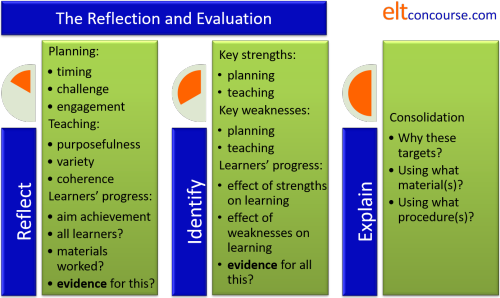How to write a good Delta Module Two Reflection and Evaluation

Is the Reflection and Evaluation important?
Yes! The ability to evaluate what happened in the classroom and
why is critical.
A failed lesson may be rescued by a good Reflection and Evaluation
because it shows insight and honest reflection. A Pass lesson may
be considered a Merit or better for the same reason.
Your role at this stage of the assignment is reflector not planner,
justifier or assessor.
The criteria for this section are:
Successful candidates demonstrate that they can effectively:
- reflect on and evaluate their own planning, teaching and the learners’ progress as evidenced in this lesson
- identify key strengths and weaknesses in planning and execution
- explain how they will/would consolidate/follow on from the learning achieved in the lesson
Don't be tempted to refer in general to your teaching abilities. This document is about this lesson.
 |
What assessors sometimes say on 10a: The candidate reflects on the lesson and some of its main strengths and weaknesses but makes no comment on her planning (as it turned out, a key issue in terms of timing and challenge). Much of what is written here concerns the candidate's own progress and professional development. Very little is said about what the learners achieved. The candidate has failed to identify any evidence to support her assertions concerning strengths and weaknesses and their effects on learning. |
This criterion addresses three areas:
- The plan

You must refer to how the plan worked out in practice. Think about:- Timing:
Did you allow enough / too much time for everything?
What effect on learning did any weaknesses here have? - Challenge:
Was this about right?
What effect on learning did any weaknesses here have?
For example:
The most important weakness in this lesson has its roots in the plan. I had not allowed for sufficient practice and preparation time before the students were asked to re-tell the stories. As a result, they were not consistently using the target exponents although there was evidence from the writing stage which I monitored that they had acquired many of them actively and all of them passively.
The lesson's most obvious strength, that the learners were engaged and motivated throughout, also had its roots in my planning. Judging from their responses, I had chosen a topic of interest to them and a set of procedures which allowed them to engage with the materials. As a result, my two main learning objectives were achieved. - Make explicit reference to any changes to the plan and say
a) why you made the change
and
b) what effect it had.
For example:
Pressure of time, and the need to get on to stage 8, which provided for important consolidation and gave the learners a record of the language, meant that the pronunciation practice was cut short. This impacted on the learners' ability to produce the target items successfully in Stage 9, however, and will need to be remedied in a future lesson.
- Timing:
- The lesson

You need to reflect on the lesson as a whole. Think about:- Purposefulness:
Was the lesson coherent and did it show clear development?
For example:
Because I wanted the lesson to be purposeful and engaging, I deliberately set quite a fast pace. This did not affect learning outcomes for the majority although I saw that Javier and Monica found it challenging. I'll check their homework carefully to see if it affected their learning. - Variety:
Was there an adequate variety of interactions and activity types to keep the learners engaged?
For example:
The variations in interaction patterns (in particular, the pyramid grouping) worked as I planned to provide engagement and commitment to the tasks.
- Purposefulness:
- The learners' progress

This is the key area. Ask yourself:- What could the learners do by the end
of the lesson that they couldn't have done at the beginning?
For example:
The final role play demonstrated to me and the learners that they had grasped the key intonation contours and sentence stress patterns which formed the main objectives for them. More work on meaning and style of the lexis will still be needed. - Did they all achieve
what you set out to help them to achieve?
Only Marjorie is still unable to get to grips with the structure, unfortunately, and this lesson confirmed my belief that she has been placed above her level. I will act on this with the Academic Manager. - Did the materials engage and
motivate?
For example:
I was pleased that the topic was clearly engaging for the whole class (unsurprisingly, as it is a theme close to their own experiences). My observation was that the learners found the poster-design task engaging and the outcomes were better than I predicted. - If I assert that, e.g.,
my aims
were achieved, do I refer to any evidence from the lesson
to back this up?
For example:
The final round-up and re-cap stage demonstrated to me that the essentials of this use of the tense form had been grasped and that the learners are aware of its use. Revision will be needed because there were some persistent errors in the final dialogue-building tasks.
- What could the learners do by the end
of the lesson that they couldn't have done at the beginning?
 |
What assessors sometimes say on 10b: The candidate identifies a number of strengths and weaknesses but has not prioritised these in terms of effect on learning outcomes. The candidate's view of the lesson is overly positive with only strengths identified. The candidate has failed to note the most important weakness (i.e., the level of challenge). The candidate focuses only on weaknesses and has not identified the high levels of engagement and motivation she managed to evince. |
There are two areas to focus on:
- Priorities:
note the word 'key' in the criterion and think about effects on learning. Don't just list strengths and weaknesses. You must prioritise them by thinking about which ones had the most impact on the learning that took place (or didn't).
Just because you thought that the error you made on the whiteboard was important, that doesn't mean it was. What effect (if any) did it have on learning? For example:
The most important weaknesses in this lesson were .... because their effects on learning were ... which was shown by ...
The most important strengths in the lesson were ... because this allowed the learners to ... as was evidenced in ... - Coverage:
make sure you include strengths and weaknesses in the planning as well as the execution.
 |
What assessors sometimes say on 10c: The candidate has a number of suggestions for her own development but does not say how she would follow up on this lesson. The candidate has suggested a way forward but it is too vague to be clear and simply suggests more of the same. The candidate suggests a follow-up procedure but it is not clear how this is based on what happened in this lesson. |
Even if you are never going to see the class again, you still need to focus on this area. Remember:
- This is not about you:
it is about the learners and their progress. - Be precise:
do not talk in vague terms about, e.g., going on to practise more reading subskills or extending the learners knowledge of the structures. Say which ones, why (based on the outcomes of this lesson) and how. For example:
Following on from the comment regarding Stage 7, I need to revisit the intonation patterns which were sub-aims in terms of learning outcomes in this lesson. I shall do this by setting up a parallel role play, this time recounting an anecdote about children (a topic close to most of my learners' hearts) and thoroughly practising the feedback routines (especially Really?!, Wow! and Go on., all of which were poorly produced in this lesson).
Here's a summary of what should go in the Reflection and Evaluation. Keep it by you as you write.

You only have a maximum of 500 words to expend so use them
wisely. Be succinct and stay relevant.
Not everything in the diagram above will be relevant to all lessons.
You need to select the points in each section which are most crucial to
your lesson.
Use 300 to 350 words to reflect and identify the key issues and reserve around 150 words to set
out your future action(s).
